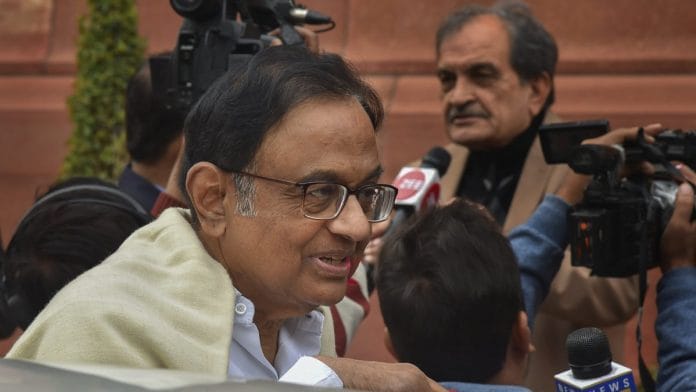New Delhi: The Supreme Court, while granting bail to P. Chidambaram Wednesday, imposed an unusual condition — restricting the former finance minister’s interaction with the media.
The three-judge bench told Chidambaram not to make any public statements or give any interviews to the media with regard to the INX Media case that involves him or any other co-accused.
The bench of Justices R. Bhanumathi, A.S. Bopanna and Hrishikesh Roy said Chidambaram will not be allowed to interact with the media for interviews or contact any of the witnesses.
After furnishing a bail bond and two sureties, Chidambaram was told to co-operate with the investigation as and when required. He has also been stopped from travelling abroad.
ThePrint reached Solicitor General Tushar Mehta for a comment but he refused to respond.
Although imposing conditions while granting bail is not uncommon, members of the legal fraternity said such a ‘gag order’ was unheard of.
Senior advocate Vikas Pahwa, who specialises in criminal law, told ThePrint that it was the first time that an accused in a criminal case was being subjected to such a condition.
“This condition needs to be imposed on the ED and CBI too. It cannot be that an accused is gagged whereas the other party speaks about it and jeopardises his case. It’s the first time that such a thing is happening,” said Pahwa.
Pahwa also pointed out that this condition finds no place in the Criminal Procedure Code.
“Section 437 of the Criminal Procedure Code deals with conditions which can be imposed on accused while granting bail. So, restricting him from tampering evidence, influencing witnesses and traveling abroad are usual ones. But such a media gag is not mentioned,” said Pahwa.
Senior advocate Avi Singh also said that such restrictions were not common in bail orders.
On a request by Mehta, the bench included that findings in this order will not have any bearing on cases against other accused. This was in relation to similar ED cases of irregular FIPB approvals against Chidambaram’s son Karti, who is currently on bail.
Senior advocate Geeta Luthra too agreed that imposing a gag order was not common and she could not “recollect any such similar orders”. But, she added, the intention of the Supreme Court was to “prevent a media trial”.
“The direction is certainly not common but it is only there so that the accused cannot take leverage out of the order and discuss the merits of the case. The SC was only trying to prevent a media trial in the case and this is not wrong,” said Luthra, who is appearing for former union minister M.J. Akbar in his defamation suit against journalist Priya Ramani.
Also read: Chidambaram keeps the trend alive: Why all Indian politicians fall sick on landing in jail
Not entirely unusual
In March, the Madurai bench of the Madras High Court imposed a similar gag order while granting bail to Nirmala Devi, the main accused in the sex-for-cash scandal in the Madurai Kamaraj University. Nirmala Devi had been arrested 11 months earlier.
In 2008, too, a sessions court had placed restrictions on Maharashtra Navnirman Sena chief Raj Thackeray’s gatherings and public speeches. The case was related to the ‘exodus’ of North Indians from Mumbai allegedly as a result of Thackeray’s speeches.
Also read: In denying bail to Chidambaram, Delhi HC mixes up facts from 2017 money laundering case







At last he’s out! The bale should’ve been given months ago.
Now it can be established if he’s really guilty or not.
Only in India can a person be jailed for so long based on the testimony of a murder accused.